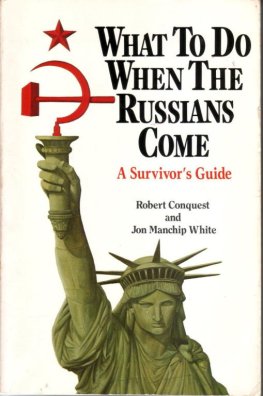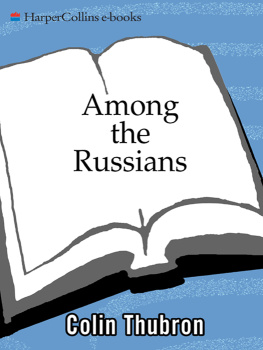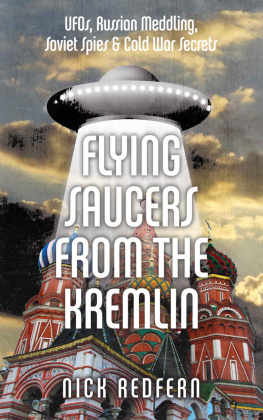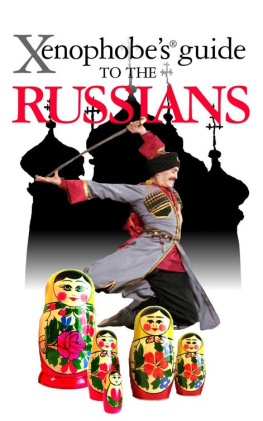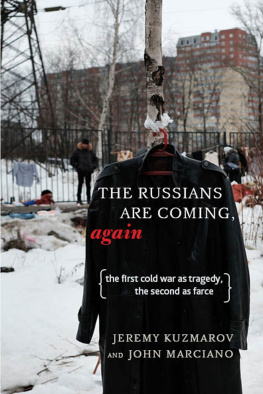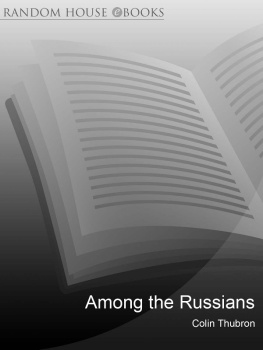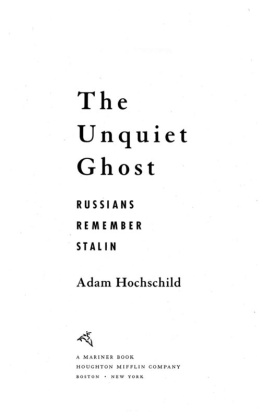Russians as the New Minority
Russians as the New Minority
Ethnicity and Nationalism in the Soviet Successor States
Jeff Chinn
Robert Kaiser
The University of Missouri-Columbia
First published 1996 by Westview Press
Published 2019 by Routledge
52 Vanderbilt Avenue, New York, NY 10017
2 Park Square, Milton Park, Abingdon, Oxon OX14 4RN
Routledge is an imprint of the Taylor & Francis Group, an informa business
Copyright 1996 by Taylor & Francis
All rights reserved. No part of this book may be reprinted or reproduced or utilised in any form or by any electronic, mechanical, or other means, now known or hereafter invented, including photocopying and recording, or in any information storage or retrieval system, without permission in writing from the publishers.
Notice:
Product or corporate names may be trademarks or registered trademarks, and are used only for identification and explanation without intent to infringe.
Library of Congress Cataloging-in-Publication Data
Chinn, Jeff.
Russians as the new minority: ethnicity and nationalism in the Soviet successor states / Jeff
Chinn, Robert Kaiser.
p. cm.
Includes bibliographical references and index.
ISBN 0-8133-2249-9 (alk. paper). ISBN 0-8133-2248-0 (pbk.: alk. paper)
1. RussiansFormer Soviet republics. 2. NationalismFormer Soviet republics. 3. Former Soviet
republicsEthnic relations. I. Kaiser, Robert John. II. Title.
DK35.5.C48 1996
947dc20 96-6849
CIP
ISBN 13: 978-0-367-28649-1 (hbk)
The decision to focus on Russians outside the Russian Federation in this study of interethnic conflict and conflict management was made for several reasons. First, the disintegration of the USSR caused the 25 million Russians living outside Russia to become overnight the largest ethnic minority in Europe. Second, Russians are found in significant numbers in all of the Newly Independent States (NIS), making a comparative study of interethnic conflict and conflict management throughout the former USSR possible. Third, and perhaps most importantly, Russians were the dominant group in the USSR, and they exercised this dominance not only in Russia but in all of the former union republics. The titular nationalism that arose during the 1980s was frequendy and pointedly anti-Russian as well as anti-Soviet; the success of the independence movements thus resulted in a dramatic status change between Russians outside Russia and members of the titular groups. This status shift makes the interaction between Russians and titular nations of particular interest as the latter have become dominant in the newly emerging states.
Our principal objective in writing this book was to re-examine several theories of nationalism in light of the unfolding titular-Russian relationships in the non-Russian successor states. Most studies assessing nationalism in the NIS have adopted decolonization as their overarching theoretical framework. This approach has some utility, but its limitations often outweigh its explanatory power. First, treating the USSR as an empire like any other is problematic, and not only because of its "internal" nature. The state was created in part as an anti-imperial act, and several of the USSR's nationality policies worked at cross purposes with Russian hegemony. Second, the imperial analogy became less accurate over time. Particularly during the post-Stalin period, Russian dominance outside Russia was increasingly challenged by titular elites; in most republics a two-tiered system of ethnic stratification developed with Russians losing their dominant place to upwardly mobile members of the titular groups. Third, the imperial analogy and decolonization are much more accurate depictions of titular-Russian relations in some regions than in others. In Central Asia and Azerbaijan, this approach has much greater merit than in the Baltics, Georgia, and Armenia, yet decolonization is typically treated as if it were equally applicable in all of the NIS. Finally, decolonization approaches tend to oversimplify the titular-Russian relationship. Analysts using this approach see this relationship as unidimensional, with the titular nations as victims of the hegemonic Russians. Local Russians are portrayed as having little legitimate place in the non-Russian republics; the solution to the unfolding conflict is thus the removal of the alien Russians from these non-Russian homelands.
While not rejecting decolonization approaches in their entirety, we have attempted to examine the unfolding titular-Russian relations in the NIS using theoretical frameworks that allow for greater complexity. This book attempts to assess these interethnic relationships from a less russophobic viewpoint while at the same time avoiding the opposite russocentric approach. We were particularly interested in applying the concept of interactive nationalisma refinement of reactive ethnicityas both an explanatory and predictive model for inter-ethnic behavior.
The structure of the book reflects two basic positions that we took from the outset. First, we treat nationalism in the NIS as an interactive process. We emphasize that nationalism began long before the 1980s, yet is not a "primordial" sentiment. thus provides an in-depth assessment of the titular-Russian relationship in the fourteen non-Russian states.
Although both authors were involved in the research, writing, and editing of all the materials incorporated in the book, Professor Chinn initiated the project and was the principal author of .
Jeff Chinn
Robert Kaiser
This study benefited from financial support and scholarly input from a variety of sources. The authors gratefully acknowledge the assistance they received from the Missouri University Research Board for research, travel, and released time for this project. Professor Kaiser also received a Social Science Research Council postdoctoral grant, which was instrumental in supporting the research and writing for his contribution to this book. Professor Chinn also received travel support from International Research and Exchanges Board (IREX) to support his research.
In addition to this financial support, the authors wish to express their deep appreciation to the numerous scholars working on related research who provided invaluable input during the research and writing of the book. The authors would especially like to thank Ian Bremmer (Hoover Institution), Ralph Clem (Florida International University), William Crowther (University of North Carolina-Charlotte), John Heyl (University of Missouri), Charles King (Oxford University), Robin Remington (University of Missouri), Michael Sacks (Trinity College), Nikolai Petrov and Vladimir Kolosov (Institute of Geography, Russian Academy of Sciences), Mikhael Guboglo (Institute of Ethnology and Anthropology, Russian Academy of Sciences), Zhanna Zayonchkovskaya and Galina Vitkovskaya (Institute for Economic Forecasting, Russian Academy of Sciences), Professors Alexandr Susokolov and Revaz Gachechiladze (Institute of Geography, Georgian Academy of Sciences), Professor Juozas Lakis (Vilnius Pedagogical University), Professors Edgars Osins, Einars Semanis, and Peteris Zvidrins (University of Latvia), Aksel Kirch and Marika Kirch (Estonian Academy of Sciences), and Professor Nurbek Omuraliev (Center of Social Research, National Academy of Sciences of Kyrgyzstan). The authors also thank Post-Soviet Geography, Professor Chauncy Harris, and the Geographic Resource Center, Department of Geography (University of Missouri-Columbia), for their assistance in providing the maps for this work. Finally, the authors acknowledge the students who participated in a graduate seminar on Russians as a new minority during the Fall 1993 semester and who provided valuable insights and feedback at an early stage in the research.


